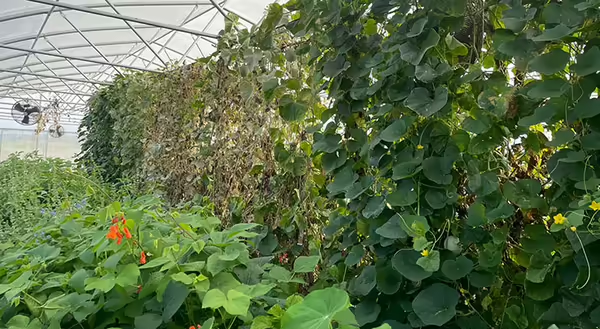
In walking through the hydroponic tunnel at the Dixon Springs Agricultural Center this week, the stark difference in powdery mildew disease pressure could not be ignored and was the inspiration for this article.
In the guide from Missouri Extension, High Tunnel Melon and Watermelon Production, originally authored by Lewis W. Jett and revised by David Trinklein, the table lists potential melon cultivars that could be suitable for high tunnel production, and within that table disease tolerance is listed for the cultivars, along with cucurbit type, days to maturity, and fruit description.
- ‘Sugar Cube’ is an F1 hybrid with tolerance to fusarium and powdery mildew.
- ‘Jenny Lind’ is an heirloom cultivar with no tolerance to fusarium and powdery mildew.
In hydroponic production, fusarium tolerance is not really a factor that needs to be considered, but powdery mildew can definitely be problematic within high tunnel/protected culture systems. Disease tolerance differences between the two cultivars is illustrated very well in the photo taken of muskmelons being grown hydroponically at DSAC. The dark green vines on the right-hand side of the photo are ‘Sugar Cube’ and immediately to the left, the brown and whitish dying vines are ‘Jenny Lind.’
Seeing the drastic difference between these two varieties being grown side by side in the same environment and receiving the same amount of nutrient solution is a strong reminder of the importance of disease resistance when making variety selections.
Flavor and fruit quality are extremely important in terms of marketability when selecting varieties, but consistent, reliable yields are also important. Disease resistance can have a significant impact on yield and is an important cultural disease management tool. Finding ways to reduce the need for or number of fungicide applications reduces overall labor and input costs and helps to increase profitability.
Dr. Margaret McGrath, associate professor at Cornell University, prepared the following resource information for commercial growers in March 2022, Tips on Using Resistant Varieties for Managing Plant Diseases. The information shared in this resource offers important facts to think about regarding resistant varieties. Disease resistance is just one tool in an overall disease management plan toolkit and shouldn’t be relied upon completely for control.
Photo credit: B. Aly, Illinois Extension 2023